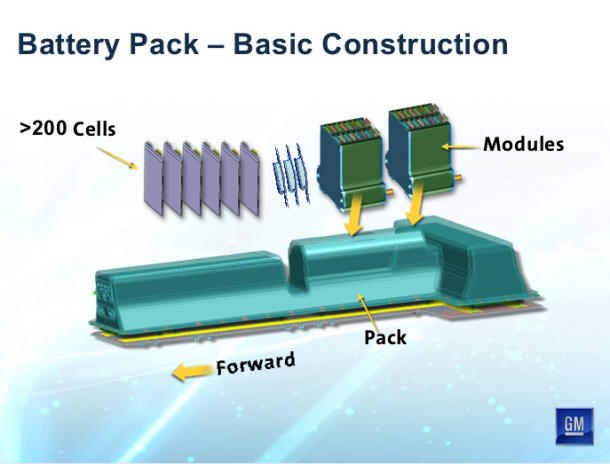
Mock-up of LG Chem battery for 2011 Chevrolet Volt
The agreement allows GM to use the technology throughout its supply chain, and covers a suite of patents that includes and builds on the technology used in the 2011 Chevrolet Volt.
"The Argonne license is going to allow GM to continue to work on next-generation battery systems, to reduce cost, and improve performance of those systems," said Jon Lauckner, president of GM Ventures. "And you have to go back to the basic chemistry of battery cells to get those kind of improvements--and that's what makes the Argonne intellectual property so valuable."
Return of taxpayer investment, additional Michigan jobs?
The agreement "represents a really important return on taxpayer money, an investment in energy technology research both for Argonne and the Department of Energy," said Argonne director Eric Issacs, in a conference call held for the announcement.
It also results in U.S. jobs: The technology will also be applied at LG Chem's battery assembly facility in Holland, Michigan, which will open in 2012 and employ 400.
In 2008, the U.S. manufactured just two percent of the world's advanced batteries, but it's expected to make up to 40 percent of them--or enough for 500,000 electric vehicles annually--by 2012.
GM said that there's still a lot of development work and validation to be done for this technology, which would be used not in current electrified vehicles but next-generation ones--such as the next-generation version of the Volt, or a future plug-in hybrid.
Volt has it now; but open to other automakers
The license to use Argonne's patented composite cathode technology will be granted both to GM and to LG Chem, which builds the large-format lithium-ion cells used in the Volt's 16-kilowatt-hour battery pack. LG Chem confirmed that the company's battery technology is open to license by other automakers.
The new technology is already being used in the 2011 Chevrolet Volt, the world's first mass-produced range-extended electric car (or plug-in hybrid, if you prefer). First deliveries of the Volt took place last month, kicking off in New Jersey.
Argonne's cathode--a nickel-manganese-cobalt material--offers increases of 50 to 100 percent in energy storage over previous generations of cathode material. It uses a mixed-metal oxide containing both lithium and manganese to extend operating time between charges, lengthen the cell's life span, and improve safety.
For Volt buyers, this means the battery will last longer between recharges and can be charged at higher voltages (on an individual cell level, not at the plug)--meaning shorter recharge times--than it otherwise would have. LG also confirms stronger safety and a longer life as potential advantages of these materials advances.

Chevrolet Volt Battery
[General Motors, Argonne National Laboratories]













